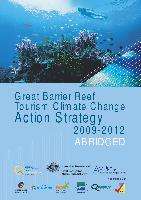Please use this identifier to cite or link to this item:
https://hdl.handle.net/11017/200Great Barrier Reef Tourism Climate Change Action Strategy 2009-2012: Abridged

View this entry
Full metadata record
| DC Field | Value | Language |
|---|---|---|
| dc.date.accessioned | 2012-05-25T01:18:15Z | en |
| dc.date.available | 2012-05-25T01:18:15Z | en |
| dc.date.copyright | 2009 | en |
| dc.date.issued | 2009 | en-US |
| dc.identifier.isbn | 9781876945985 | en |
| dc.identifier.uri | http://hdl.handle.net/11017/200 | en |
| dc.description.abstract | Climate change represents one of the single biggest challenges facing the globe today. For the Great Barrier Reef, climate change is a significant issue as the future health of the Great Barrier Reef and the sustainability of its tourism industry are inextricably linked and both are vulnerable to climate change. Research by Tourism Australia shows visitors from the key markets of the UK, China and Japan rank climate change in their top three issues of concern and importance in holiday planning. Through strong partnerships developed over many years, tourism industry leaders and the Great Barrier Reef Marine Park Authority, working together as the Tourism Climate Change Action Group, have developed the Great Barrier Reef Marine Tourism Climate Change Action Strategy 2009-2012 (the Strategy). | en |
| dc.language.iso | en | en |
| dc.publisher | Great Barrier Reef Marine Park Authority | en |
| dc.rights | Copyright Commonwealth of Australia. This work is copyright. Apart from any use as permitted under the Copyright Act 1968, no part may be reproduced by any process without the prior written permission of the Great Barrier Reef Marine Park Authority. | en |
| dc.subject | Great Barrier Reef (Qld.)-Climate | null |
| dc.title | Great Barrier Reef Tourism Climate Change Action Strategy 2009-2012: Abridged | en |
| dc.type | Report | en |
| dc.subject.asfa | Climatic changes | en |
| dc.subject.asfa | Ecosystem resilience | en |
| dc.format.pages | 20 | en |
| dc.description.notes | ID: 1768 | en |
| dc.contributor.corpauthor | Great Barrier Reef Marine Park Authority | en |
| dc.bibliographicCitation.stpage | 52 | en |
| dc.subject.apais | Environmental management | en |
| dc.subject.apais | Tourism | en |
| dc.publisher.place | Townsville | en |
| dc.relation.connectiontogbrmpa | GBRMPA published this item | en |
| dc.subject.category | Information Publication Scheme | en |
| dc.subject.category | Tourism | en |
| dc.subject.category | Climate change | en |
| dc.subject.category | Tourism operators | en |
| dc.subject.theme | Managing Multiple Use | en |
| dc.subject.theme | People and actions | en |
| dc.subject.theme | Effects on the Reef | en |
| dc.keywords | C2 | en |
| dc.keywords | C1.1 | en |
| dc.keywords | C2.2 | en |
| dc.keywords | B2.2 | en |
| dc.keywords | B2.3 | en |
| dc.keywords | B2 | en |
| dc.keywords | B2.4 | en |
| dc.keywords | C1.2 | en |
| dc.keywords | CCAP output | en |
| dc.keywords | CCAP 08/09 | en |
| dc.keywords | 3.2C.402.4.08 | en |
| dc.keywords | B2.1 | en |
| dc.keywords | 328 | en |
| dc.keywords | C1 | en |
| dc.keywords | C2.1 | en |
| dc.keywords | climate change | en |
| dc.keywords | Factors Influencing-vulnerability to ecosystem | en |
| dc.keywords | Existing protection and management | en |
| dc.keywords | resilient GBR ecosystem | en |
| dc.keywords | adaptation of industries and communities | en |
| dc.keywords | direct use | en |
| dc.keywords | Commercial marine tourism | en |
| dc.keywords | Great Barrier Reef | en |
| dc.keywords | climate change action plan 1 | en |
| dc.keywords | Factors Influencing-implications for regional communities | en |
| dc.keywords | Adaptation | en |
| Appears in Collections: | Community | |
Files in This Item:
| File | Description | Size | Format | |
|---|---|---|---|---|
| Great-Barrier-Reef-tourism-climate-change-action-strategy-2009-2012.pdf | 2 MB | Adobe PDF |  View/Open |
Items in the ELibrary are protected by copyright, with all rights reserved, unless otherwise indicated.
